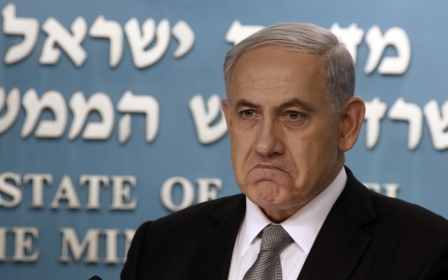Tzipi Livni quits politics: 5 key moments in Israeli leader's career

A decade ago, Tzipi Livni was just a hair’s breadth away from the Israeli prime minister's office.
On Monday, in the wake of recent polls that showed her party wouldn't meet the threshold in national elections scheduled for 9 April, Livni announced that neither she nor the Hatnuah Party she founded in 2012, would fight to keep their seats in the next Knesset, Israel's parliament.
"I am leaving politics," she said during a news conference. "I have the internal strength to continue fighting, but we don't have enough political power to actualise our vision on our own."
Livni's decision, in fact, came after she spent weeks searching Israel's political landscape for potential partners, following Labor Party leader Avi Gabbay's decision at the start of 2019 to publicly dismiss her and Hatnuah from the Zionist Union, a four-year-old coalition formed in advance of the last national election.
Ultimately, that search proved fruitless - and she was forced to admit defeat and retire.
Stay informed with MEE's newsletters
Sign up to get the latest alerts, insights and analysis, starting with Turkey Unpacked
Livni began her political career with Prime Minister Benjamin Netanyahu's ruling Likud party, entering the Knesset for the first time twenty years ago, in 1999.
When then-Prime Minister Ariel Sharon left Likud and founded Kadima, Livni accompanied him and later went on to lead the party.
Facing off against Netanyahu for the prime minister's office in 2009, Livni could have taken the top job and kept Likud out of power – if only she had agreed to include Palestinian parties in her prospective coalition government.
But she refused to consider such a move, and as a result, was unable to block Netanyahu's stint as premier, now over a decade long and counting.
Many commentators in Israel have eulogised the centrist politician's career since she announced she was quitting politics this week, despite her record being more controversial than it's currently being portrayed.
Here are five key moments in Livni's 20-year career in Israeli politics:
Derailing Palestinian right of return
In 2004, as Israel's immigrant absorption minister, Livni convinced the administration of then-US President George W Bush to accept Israel's dictat regarding the right of return of Palestinian refugees displaced in the war of 1948.
'It struck me as a harsh defense of the ethnic purity of the Israeli state when Tzipi said it'
- Condoleeza Rice
Israel held that none of the hundreds of thousands of Palestinians should be allowed to go back to their former homes in the territories that became the State of Israel.
This, in spite of the United Nations General Assembly's Resolution 194, which states that "refugees wishing to return to their homes and live at peace with their neighbours should be permitted to do so".
However, Livni persuaded American mediators - then led by US Secretary of State Condoleeza Rice - to back Israel's obstinate refusal to allow Palestinian repatriation in its territory.
Rice even wrote about Livni's argument that the arrival of non-Jewish refugees would reduce Jewish demographic dominance in Israel, in her 2012 autobiography, No Higher Honor.
"It struck me as a harsh defence of the ethnic purity of the Israeli state when Tzipi said it," Rice wrote.
"Despite the dissonance that it stirred in me, I suggested that the president include the line that made clear that Palestinian refugees would be expected to live in Palestine."
Offer to disenfranchise Palestinian citizens of Israel
In 2008, Israelis and Palestinians remained stuck in negotiations, failing to arrive at any permanent status agreement. Livni, in her position as foreign minister, headed the Israeli negotiating team at the time.
A few years later, in 2011, documents leaked by The Guardian and Al Jazeera called The Palestine Papers revealed that Livni had made a striking offer to Palestinian negotiators in 2008.
The border running between Israel and the nascent State of Palestine could be altered by agreement, Livni proposed, so that several villages inside Israeli territory populated by Palestinian citizens of Israel would find themselves on the Palestinian side.
The offer to relinquish border-area villages, such as Bartaa, Baka al-Gharbiyeh, and Beit Safafa, was never picked up by the Palestinian negotiators, and the Israeli side never brought up the issue again.
But the episode showed that Livni considered the expulsion of Palestinians in Israel to be a legitimate tactic.
'There is no humanitarian crisis in Gaza'
When Israel attacked Gaza in late 2008, Livni was Israel’s foreign minister and a member of its security cabinet, making military decisions.
The Israeli assault on the coastal enclave, dubbed Operation Cast Lead, killed hundreds of Palestinian civilians - nearly 300 by Israel's own count, a third of whom were minors. Israeli and Palestinian human rights groups say the true figure was more than double that.
While the war raged, Livni flew to France to meet with then-President Nicolas Sarkozy. There, she dismissed concerns that the Israeli bombardment was taking a terrible toll on Gaza's civilian population.
'There is no humanitarian crisis in the Strip and therefore there is no need for a humanitarian truce'
- Tzipi Livni during Israel's 2008-2009 offensive on Gaza
"Israel has been supplying comprehensive humanitarian aid to the strip,'' said Livni, even while media outlets and human rights groups reported that many of Gaza's residents - who then numbered about 1.5 million - were suffering serious shortages of food, water and electricity.
"There is no humanitarian crisis in the Strip and therefore there is no need for a humanitarian truce," Livni said.
Within a year, a British court had issued an arrest warrant for Livni over her role in Israel's assault on Gaza and in the years that followed, she avoided visiting the UK for fear of arrest.
Later, after a Tory government was voted in, British laws were amended to protect Livni and other Israeli officials from possible war crimes prosecution.
Waging war against banners
As Netanyahu's justice minister, Livni was once again a member of the Israeli security cabinet when Israel assaulted Gaza during 2014's Operation Protective Edge.
More than 1,500 Palestinian civilians, including 519 children, were killed during the Israeli military offensive, the United Nations said.
Just days after the assault ended, Livni flew to a southern European seaside resort for some rest and relaxation. There, she was met by Greek activists who raised banners in solidarity with Palestinians.
On her Facebook page, Livni posted a picture of herself fiddling with the banner and narrated that she had tried to tear it down.
"The battle is still ahead of us - the battle for international opinion," Livni wrote. "We need to act everywhere in the world so it will be clear who here is the terrorist and who is the state that is defending its citizens from terror."
About-face on 'Nation-State' law
When Israel's Nation-State law was passed in July, giving Jewish citizens more rights than non-Jewish ones, Livni was one of several opposition lawmakers who preached against it from the Knesset plenum.
Like other centrist members of the Israeli parliament, Livni argued that she agreed with the law's affirmation of the state's Jewish character, but she said she was troubled that it did not also include assurances of the state's democratic character.
Livni's opposition to the law marked a shift from her earlier position, however.
When the law was first drafted almost a decade earlier, in 2009, she expressed support for it in principle. At that time, the bill was first proposed in the Knesset by her deputy, Avi Dichter, and co-signed by another 20 MKs from the Kadima Party, then led by Livni.
Over the decade that followed, Israeli politics continued to shift to the far right, and by the time the law was finally passed, it no longer paid lip service to a guarantee of equal rights for all citizens, regardless of race or religion.
Without even those caveats, the law’s passage defeated the original purpose Livni had hoped the law would accomplish: present a palatable version of Israel's discriminatory legislation.
Middle East Eye delivers independent and unrivalled coverage and analysis of the Middle East, North Africa and beyond. To learn more about republishing this content and the associated fees, please fill out this form. More about MEE can be found here.





